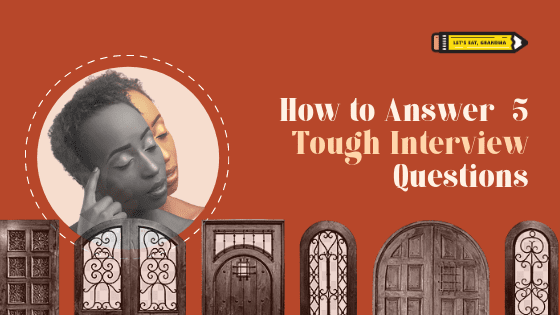Learn How to Answer 5 Tough Interview Questions

If you want to nail a job interview, you have to prepare. We asked Merryn Roberts-Huntley, one of our favorite career coach partners, to give her best answers to 5 tough interview questions.
By: Katelyn Skye Bennett | Contributor for Let’s Eat, Grandma
Interviews can inspire a mess of nerves, but a little preparation goes a long way. We consulted Merryn Roberts-Huntley, the owner, principal career coach, and self-described confidence builder at Made to Hire, for advice on how to answer common interview questions that often stump job seekers.
She’s connected with Grandma before, and as a career navigator myself, hearing from someone with nearly three decades of experience provided some useful tidbits.
Together, we tackled five tough interview questions.
Want more job search tips? Sign up for our newsletter!
The Best Answers to 5 Tough Interview Questions
1) What’s your biggest weakness?
“Name an actual weakness,” Merryn advised, “but one you’re looking to improve. Make sure it isn’t a competency that is important to the position, and be sure to share what you’ve done to work on it.”
To clarify, don’t say you don’t have any weaknesses. (Yes, people claim that, though it’s often out of youthful immaturity rather than arrogance, in my experience.) Don’t make one up out of false humility like, “Folks tell me I work too hard” or “I’m just such a perfectionist.”
DO say something truthful but not central to the job for which you’re interviewing. If the job posting lists “advanced knowledge of Adobe Photoshop” as a required qualification and that’s a skill you’re still working on, saying that your biggest weakness is Photoshop will hurt you!
And always include how you’re working on it, like Merryn said. Reclaim your weakness from a standpoint of honesty, humility, and growth. This will show that you’re self-aware, proactive, and dedicated, which is what this question is really about. Risk-taking, certain soft skills, and attention to detail are great places to start.
An example response might be:
“I would say that I am weak in the area of risk-taking. It comes from a cautious and detail-oriented mindset, but there are situations where I wait too long for approval when the best thing to do is just move forward with the risk.
I’ve been actively working on this in my current job, though. My boss has challenged me to ask her only two questions per week, and so far I have risen to the challenge and become more comfortable taking the risks of submitting content without her approval.”
Keep in mind that the answer to this question may vary based on your desired role or the company’s mission, so always practice before you attend a new interview.
(Curious about capturing your biggest strengths? Check out this article!)
2) Can you explain this gap on your resume?
“First off, if you have gaps on your resume, I suggest using just years instead of months and years for the dates on your resume, as that will make gaps look less obvious,” Merryn shared. “If you’re still faced with this question, be honest but put a positive spin on your answer. Great examples would be talking about taking some time off to travel or focusing on a volunteer project you were passionate about. Be careful not to devalue yourself in your answer,” she added.
But what if your gaps aren’t due entirely to privilege? Here are some example answers that you might find helpful:
- “I took some time off to care for my child (or grandparent, sick family member, etc.).”
- “I needed to focus on my education for a semester.” (Leverage your education section here too to make it obvious that it wasn’t really a gap.)
- “It was a seasonal job — it was a valuable experience, but I’m ready to use it as a stepping stone to something bigger.”
- “The commute was too difficult. I lived an hour and a half away, and it wasn’t sustainable.”
- “My job was eliminated due to the pandemic.” (We have more advice for you here.)
As Merryn suggested, know your worth and communicate it even when answering these tough questions.
Of course, you’ll want to have as few gaps as possible, so even if using just years instead of months and years helps out your resume, sustaining a job until you are hired for a new one is always wise if possible. However, life happens, and good hiring professionals will understand your situation if you explain it well. We hope these answers will serve as a launching point for you to reenter the workforce!
3) Why did you leave your last job?
Merryn suggests, “Explain that you’re ready for a new challenge; it’s always a great answer. Focus on the positives of what you want to achieve if you get this new job, and avoid bad-mouthing the company or co-workers at your last job.”
Nobody likes a negative person. Complaining doesn’t make a good first impression. And if you malign your previous employer, who’s to say you won’t do the same to your next one? Instead, display a growth or future-oriented mindset, which can impress your potential boss. Convey what you want to achieve in the future instead of dwelling on the past.
For example:
“My time with [company] was great overall, and I learned a lot, but I know I am ready to rise to a more senior position in a company with more upward mobility.”
4) Why do you want to work here?
Great question! Unfortunately, many folks don’t know the answer. They simply need income. While that’s understandable, viewing the question from a perspective of sustainability can help. What about the company makes you want to stick around as opposed to another job?
Merryn says, “Share how your professional goals align with what the company does or strives to do. Give an example and explain how you see yourself as a cultural fit.”
Have you done the research on the company before applying and prior to interviewing? The company website should have most of what you need to know, including its mission, values, leadership, and departmental structure.
Where do you fit into that? That’s your answer.
For example:
“I know that Colorado Public Radio is dedicated to informing, inspiring, and entertaining all Coloradans. My own goal has always been to build connections with the community through my administration talents, and I would look forward to doing so as part of the greater mission here.”
5) What is one conflict you’ve faced in the workplace?
“Give an actual example of a challenging workplace situation, but focus on one that highlights having a different opinion on how to handle a situation rather than on a personality conflict,” Merryn recommends.
“Talk about taking a step back to collaboratively look at the goal of the project and any effort you made to brainstorm options for how to approach it. Use an example that shows your ability to communicate well with others and seek solutions that are best for the company,” she concludes.
This is a difficult question. Many times, I’ll get stories that spotlight the conflict and have zero resolution. That doesn’t inspire confidence! I’ve also heard answers where employees intentionally disobeyed their boss to address a conflict with a client, which leaves the interviewer feeling hesitant.
Other times, I’ve heard the classic customer service story about disgruntled customers who were eventually satisfied… by the manager and not the person telling the story.
Use your critical thinking skills here. Where have you applied them in your previous work? How did you effectively collaborate to problem solve, as Merryn advised? Before you decide on your example, reflect on the potential ramifications of how you present everyone involved. (This is another opportunity not to badmouth your superiors or co-workers.) Most importantly, resolve the story!
For example:
“When we were developing a new product, my boss thought it filled a business-critical need that was urgent enough to launch within the next week. I, however, thought it was worth delaying the launch to do more planning and testing for the product.
I brought these concerns to him in a face-to-face meeting, and I was able to see his point and let go of some perfectionist tendencies for the good of the company. We ended up compromising by re-assigning some tasks to different team members in order to accomplish more testing while keeping the same quick launch date.”
With answers to these five tough questions under your belt, you’re on the road to success.
Want to learn more from Merryn? Check out her work on how to ace an interview and how to wrap up an interview effectively.
Want more job search tips sent straight to your inbox? Sign up for our newsletter here:
Better Resume.
Satisfying Career.
Happier You.



